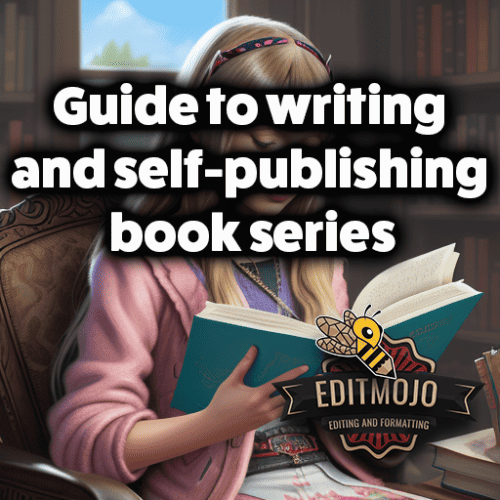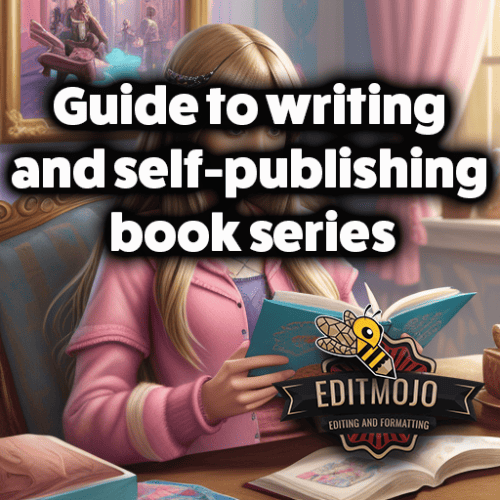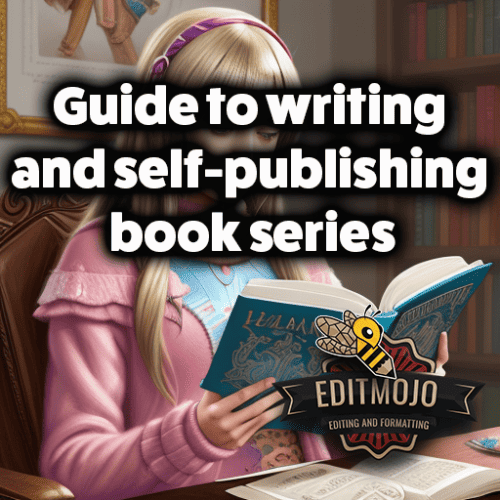Guide to writing and self-publishing book series
Guide to writing and self-publishing book series. In the literary landscape, there’s nothing quite as captivating as a well-crafted book series. Think of the enduring success of J.K. Rowling’s Harry Potter or George R.R. Martin’s Game of Thrones. In the self-publishing world too, authors like Hugh Howey with his Wool series, have found considerable success. This guide aims to walk you through the exciting journey of creating your very own book series. Let’s dive right in.
Key Takeaways
| Steps to Write and Self-Publish Your Own Book Series | Key Takeaways |
|---|---|
| Getting Started with Your Book Series | Choose your genre, develop a unique premise, world, and characters. |
| Planning the Series | Create an overall series arc, plan individual book arcs, and decide the number of books in the series. |
| Writing the Series | Establish a consistent writing schedule, maintain consistency, use cliffhangers effectively, and track details. |
| Editing and Polishing | Get professional editing, pay attention to continuity editing, and use beta readers for feedback. |
| Cover Design and Formatting | Ensure a professional, consistent cover design across the series and format books properly. |
| Self-Publishing Platforms | Choose a platform that suits your needs, understand their royalty structures. |
| Pre-Launch Strategy | Build anticipation, leverage your author platform, and use ARCs for early reviews. |
| Launching Your Book Series | Strategize your launch, consider pricing strategy for the series. |
| Marketing Your Book Series Post-Launch | Continue marketing strategies, manage reader engagement, use paid advertising. |
| Future Books and Series | Plan for subsequent series, consider standalone vs interconnected series. |
Getting Started with Your Book Series
Before delving into the art of writing a series, it’s vital to understand its benefits. A series can provide an ongoing revenue stream, builds an eager fan base, and allows for extended exploration of characters and worlds. However, crafting a successful series requires strategic planning.
Firstly, it’s crucial to choose your genre and niche. A fantasy series like Harry Potter offers a different reading experience compared to a crime thriller series like Jack Reacher. Select a genre you’re passionate about and familiarize yourself with its conventions.
Secondly, develop your series concept. This involves creating a unique premise, an engaging world, and compelling characters. For instance, The Hunger Games captivated audiences with its dystopian world and high-stakes competition. Likewise, your series concept should be distinct enough to hook readers from book one.

Planning the Series
Adequate planning is the backbone of any successful series. You need an overall series arc that maps out the major plot developments throughout the books. Consider The Lord of the Rings; the quest to destroy the One Ring provides a continuous thread through the trilogy.
Individual book arcs within the series are equally important. Each book should offer a satisfying story while contributing to the larger series arc. For example, each Harry Potter book has its own plot, yet each one also moves Harry closer to his final confrontation with Voldemort.
One crucial decision you’ll have to make is determining the number of books in your series. This could range from a trilogy like The Hunger Games to a seven-book series like Harry Potter. The number should be dictated by your story requirements and not market trends.
Writing the Series
Writing a series is a marathon, not a sprint. Establishing a consistent writing schedule is vital. Authors like Stephen King advocate for daily writing habits to maintain momentum.
Maintaining consistency across the series is crucial. Readers expect the same tone, style, and character voices across the series. Also, strategies like effective use of cliffhangers can help maintain reader interest. For example, Rick Riordan often ends his Percy Jackson books with unresolved questions, encouraging readers to pick up the next book.
Keeping track of details and continuity can be a challenge in a series. Tools like Scrivener’s corkboard feature or a simple spreadsheet can be invaluable in managing complex plotlines and character arcs.
Editing and Polishing
After writing comes the critical stage of editing. Editing for a series goes beyond individual books. You need to consider continuity editing to ensure consistency across all books. Professional editors can help identify inconsistencies or plot holes you might miss.
Consider seeking feedback from beta readers or critique partners. They can provide invaluable perspectives, especially on series-level arcs and character development.

Cover Design and Formatting
The cover is the first thing a potential reader sees, so it needs to be professional and genre-appropriate. Additionally, maintaining consistency in cover design across the series
helps establish your brand. Various platforms like 99designs or Reedsy can connect you with professional cover designers.
Proper book formatting enhances the reader’s experience. Tools like Vellum can help you format your book for various self-publishing platforms.
Self-Publishing Platforms
Once your book is polished and packaged, it’s time to publish. Numerous self-publishing platforms exist, including Amazon KDP, Smashwords, and Lulu. Each offers different royalty structures and distribution reach. While Amazon dominates the market, ‘going wide’ with multiple platforms can help reach a larger audience.
Pre-Launch Strategy
Before your book hits the virtual shelves, it’s wise to build anticipation. You can leverage your author platform, social media, and mailing lists to tease your upcoming series. Offering Advance Reader Copies (ARCs) can help garner early reviews, creating buzz for your series.
Launching Your Book Series
The book launch can be a make-or-break moment. A strategic launch can boost visibility and kick-start sales. Pricing strategy is also crucial. Many authors price the first book low (or even free) to draw readers into the series.
Marketing Your Book Series Post-Launch
Once the initial excitement of the launch subsides, continual marketing is key to long-term success. Engage with your readers through social media, author newsletters, and reader communities. Paid advertising and promotions can also help boost visibility and sales.

Future Books and Series
Once your series is established, planning for future books or series can ensure sustained success. Consider how different series might be interconnected or stand on their own. Remember, reader expectations and your author brand should guide these decisions.
Conclusion (Guide to writing and self-publishing book series)
Writing and self-publishing a book series is an exhilarating journey, filled with creativity, strategy, and hard work. However, the rewards of seeing your books in the hands of eager readers make it all worthwhile. So, get started on your series today and become the author you’ve always wanted to be.
Resources (Guide to writing and self-publishing book series)
To further your understanding and skills, explore resources such as software like Scrivener for writing, professional services through Reedsy for cover design and editing, and communities like the Self-Publishing Formula for networking and advice.
Top Five Questions and Answers
| Questions | Answers |
|---|---|
| Why should I write a book series instead of standalone novels? | A book series can provide an ongoing revenue stream, builds an eager fan base, and allows for extended exploration of characters and worlds. |
| How do I plan a book series? | Create an overall series arc, plan individual book arcs, decide the number of books in the series. |
| What should I consider when self-publishing my book series? | Ensure a professional, consistent cover design and format across the series, choose a suitable self-publishing platform. |
| How do I build anticipation before my book series launch? | Leverage your author platform, use social media, create a mailing list, offer ARCs for early reviews. |
| How do I market my book series after the launch? | Continue marketing strategies, manage reader engagement, use paid advertising, and promotions. |
Top Ten Resources and Further Reading
| Resources | Description |
|---|---|
| MasterClass | Offers various courses on writing and self-publishing. |
| Scrivener | A software tool for writers to help organize and structure their work. |
| Reedsy | A platform connecting authors with professional editors, designers, and marketers. |
| 99designs | A platform to hire freelance designers for book covers. |
| Vellum | Software for formatting ebooks and print books. |
| Amazon KDP | A popular self-publishing platform. |
| Smashwords | A multi-format, ebook self-publishing and distribution platform. |
| Self-Publishing Formula | Offers courses, podcasts, and resources on self-publishing. |
| Writer’s Digest | An online resource offering writing tips, industry updates, and writing contests. |
| The Creative Penn | A comprehensive blog and podcast for indie authors, covering writing, publishing, and marketing. |
